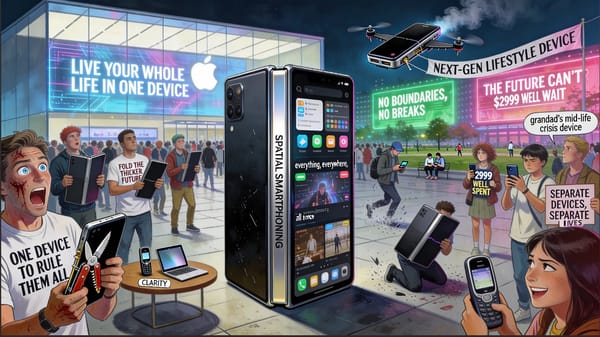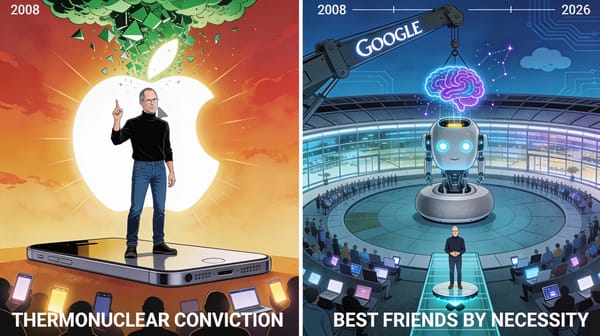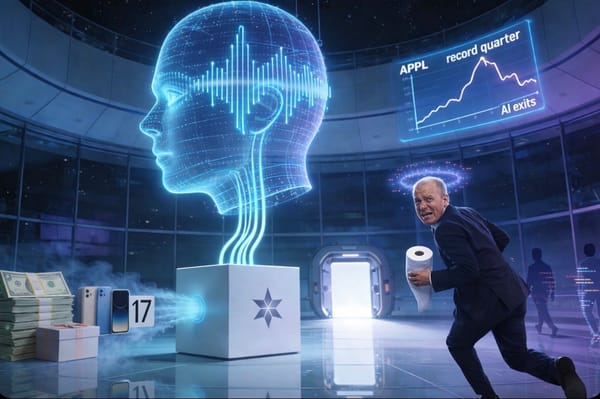⚠️WARNING! May Sting Apple Faithful. Is This the “Enshittification” of Apple? OpenAI and Perplexity Just Flew Over the Walled Garden.
Apple once conquered ecosystems. Now it risks becoming conquered. As OpenAI’s Model Context Protocol and Perplexity’s Comet turn AI into a universal interface, the App Store and “Apple Intelligence” look suddenly antique: elegant, but static. Has the “enshittification of Apple’s innovation” begun?
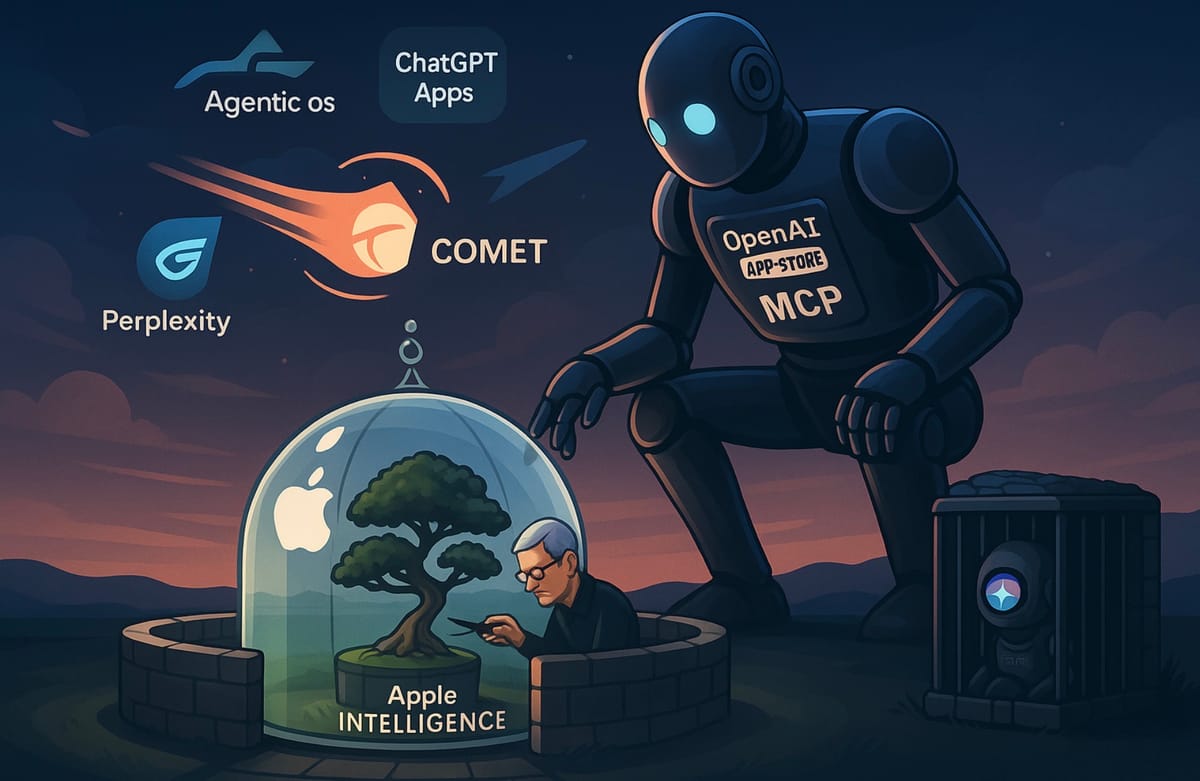
I never thought I’d even have considered using the word “enshittification” in the same sentence as Apple, but here we are (and being a rogue this was a semantic play I just couldn’t ignore): the company that once made the world’s most elegant interfaces is now, (it could be argued), becoming one itself. An AI interface, that is.
I came across Philip Elmer-DeWitt’s recent post on Apple 3.0, referencing Cory Doctorow’s term for the gradual rot of digital platforms: that slow, syrupy slide from user delight to user contempt.

Apple 3.0 Article - paywall site but worth a few bucks.
In The Guardian a few days ago, Doctorow described enshittification as “a material phenomenon, much like a disease,” whose natural history runs in three stages:

The Guardian’s Coverage of the Enshittification of Amazon. The question is, has Apple “enshittified” itself too, by just being boring?
The Doctorow three stages of enshittification
- First, platforms are good to their users.
- Then, they abuse those users to make things better for their business customers.
- Finally, they abuse those customers to claw back all the value for themselves - and become “a giant pile of shit.”
PED’s own take was measured: that Apple, so far, had largely avoided the Great Enshittening.
I’m less sure, now that he mentions it. And the word play was too much fun to put to one side, so love me or hate me, here’s my take on how, possibly, Apple may, itself, be “enshittified.”
Tell me in the comments if you think so or not, or whether it’s still mid-way to enshittifying itself, but also close enough to hold back from the edge. You know the feeling I’m talking about. Maybe you’re feeling it sink in as you read, or maybe it’s making you think? Either way, do remember I write to provoke thought, not to provoke arguments, so don’t get angry, get even by replying with a comment,
Because if you look past the marketing, the keynotes, and the orange iPhones, you start to see the same pathology, not so much through greed (though one could say price-gouging, without batting an eyelid), but through entropy. Not by extracting user value, but by failing to create new ones. By removing accessories from SKUs, not adding them. By what used to be called “nickle and dimeing” customers, or “shaving” for profits.
And last week’s twin announcements from OpenAI and Perplexity may finally mark the moment that Apple, the most successful architect of the walled garden, became the compost beneath a new kind of platform growth.
1. OpenAI’s Model Context Protocol: The App Store Killer
On October 6th, quick on the heels of Perplexity announcing its agentic browser, Comet, was “going free, and available for mobiles shortly,”
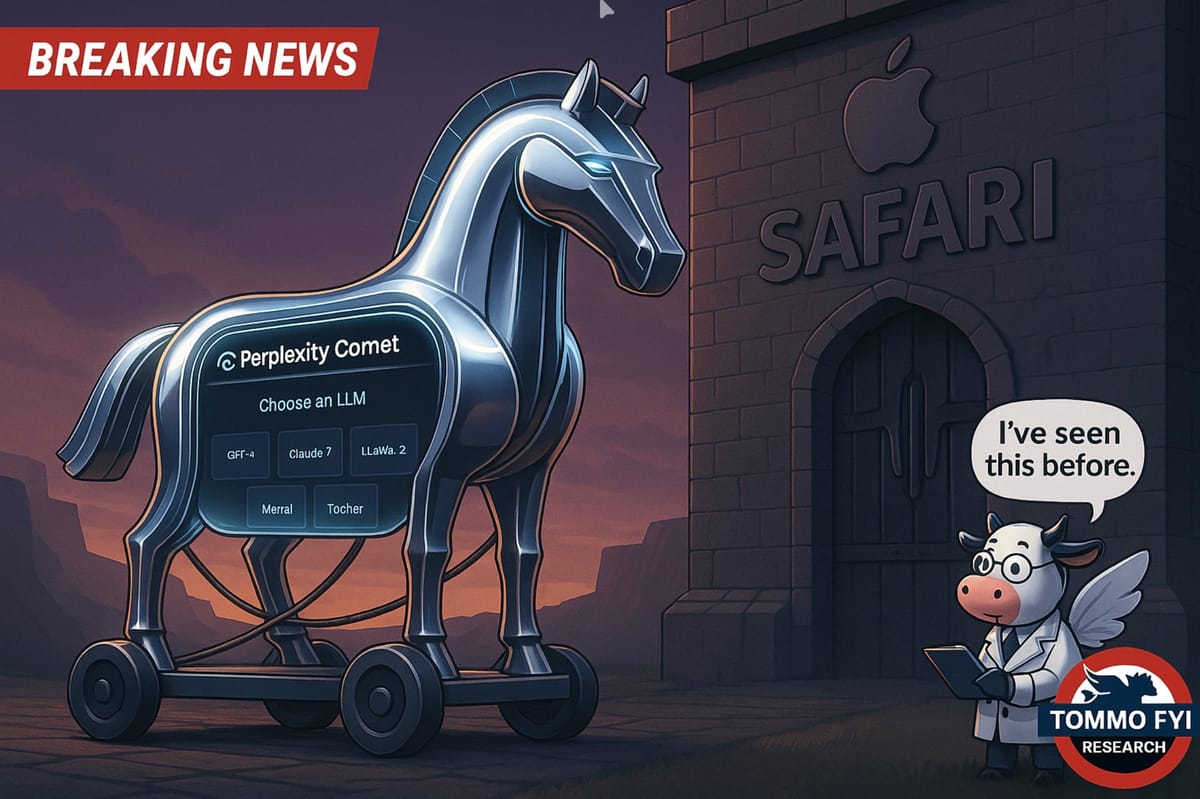
Click through to the Sunday article, and download Perplecity’s Comet for free, from the link!
… OpenAI quietly detonated one of the most consequential shifts in computing since the iPhone SDK. Buried beneath the headline of “ChatGPT Apps” was the real story:
“The Model Context Protocol (MCP) — an open standard for connecting AI models to external tools and data sources.”
MCP turns ChatGPT into a meta-OS: a universal interface layer between human intent and digital function. In practice, that means any developer can expose their API - from Spotify to Zillow - directly to OpenAI’s ecosystem, without needing to ship an app or write a plugin. The protocol, not the App Store, becomes the distribution layer.
Here’s how one well-informed CTO put it on LinkedIn:
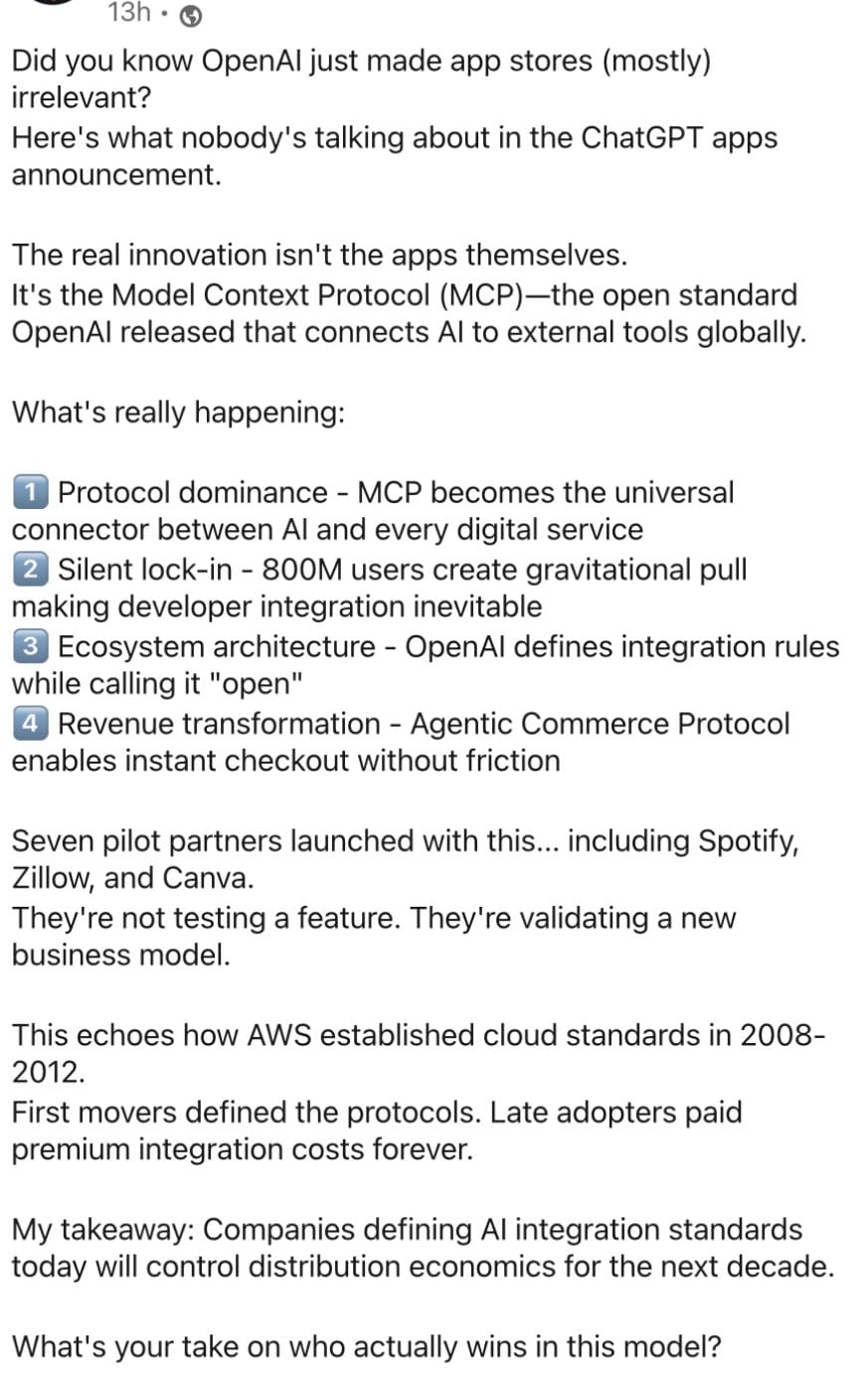
As OpenAI put it in their developer documentation:
“MCP standardizes how AI systems communicate with external tools and data globally.“
Translation: Apple’s 30% toll booth just got bypassed by syntax.
The immediate partners - Spotify, Canva, Zillow, and others - are not testing a feature. They’re validating a business model. The same one Amazon validated in 2008 with AWS: define the protocol first, and the ecosystem will follow. The same one I discussed three months ago when I wrote at length about the rise of agentic browsers and the inevitability of a GPT App Store.
Three months and a week later, and we get:

Where Apple still talks about “apps,” OpenAI is talking about capabilities. Where Apple insists on “platform guidelines,” OpenAI is building the connective tissue that lets everything talk to everything else. And opening an App Store - as I predicted 3 months ago - for Custom GPTs, such as several I’ve been working on from sectors as diverse as healthcare to AAPL analysis as many readers will know. Especially those who said understanding AI and GPT was stupid until it ”just works.” News for you, it does “just work,” you just haven’t taken the time out, yet, to “just work it out,” for yourself, hoping Apple would do it all for you. After eighteen months of discussing AI and GPT in particular, and writing about it at length, the pudding has finally arrived to show where the truth is. Apple, is your FMF and PCC or anything else ready to run, or are you still tinkering at the edges pruning for privacy while the world just surges on past you?
This isn’t an app store. It’s an abstraction store.
2. Perplexity’s Comet: The Agentic Browser Arrives
If OpenAI just unbundled the app layer, Perplexity has begun dissolving the browser itself.
In my TOMMO.FYI piece, ”Perplexity’s Comet: Now Free, with Mobile Coming Soon” (5 Oct 2025), I wrote that Comet “turns Safari into substrate - a thing other people use to build real interfaces on top of.”
That prediction took less than a week to come true.
Comet now allows you to issue natural-language commands: “play Cuz on Spotify,” “open this Netflix episode,” “check today’s AAPL RSI” - and have them execute directly, without ever touching iOS.
It’s the realisation of what I called, back in my July 3rd 2025 article, “The Rise of the Agentic Browsers,” an “Agentic OS”:
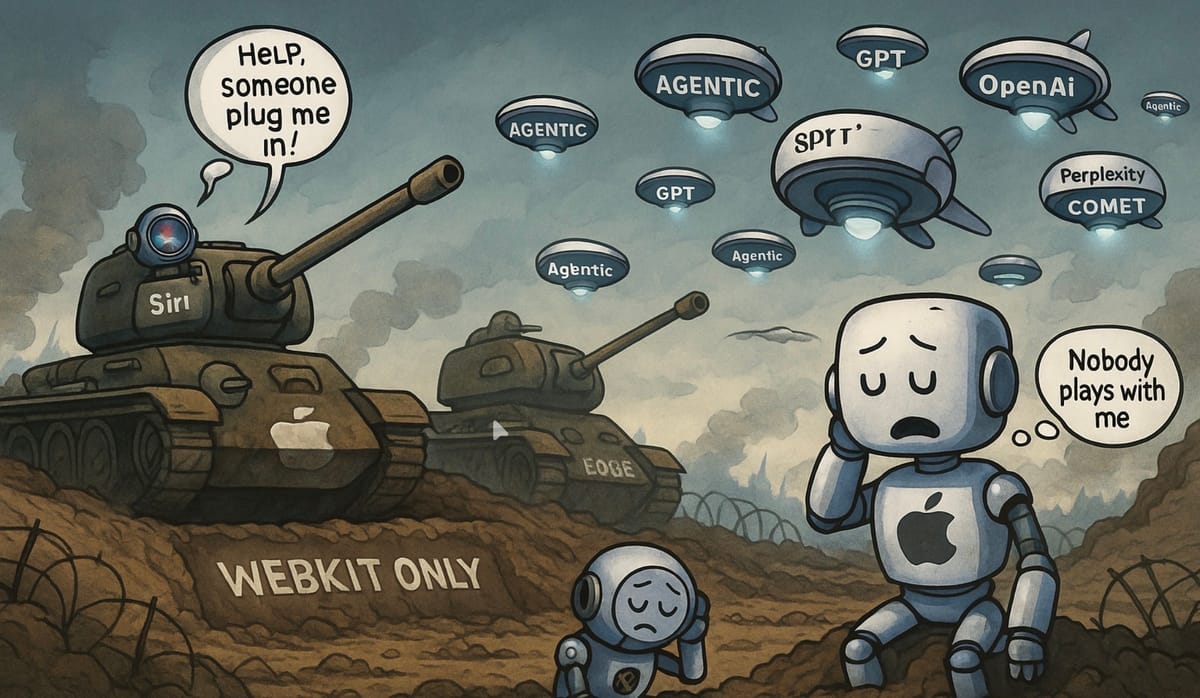
“An environment where you no longer need to open an app to get something done. You just express intent, and the browser routes it through the cognitive stack that best fulfils it.”
Comet, I wrote then, was the canary - “the first browser designed not just for users, but for agents.”
Now that OpenAI has gone fully protocol-native with MCP, and Perplexity is embedding agentic actions into its UI, the loop is closed.
You can see the shape of what’s coming:
- An AI-native operating layer that sits above every OS.
- One that doesn’t need app stores, permission dialogs, or even user patience.
- One that rides on top of iOS and macOS like a polite parasite — using Apple’s substrate, while ignoring its sovereignty.
Or, as I half-joked three months ago on July 3rd, the same day Apple lost its Head of AI Datacentres to OpenAI:
“Apple will become the host organism for other people’s Agentic OSs — unless it moves first.”
Apple moved. Backwards. Apparently we may get a Siri “Veritas” question answering machine, if Mark Gurman is to be believed. And Siri may be “unboxed,” by May sometime in 2026. Maybe. They’re not sure yet.
3. The Veritas Answering Machine and the Orange iPhone
So let’s talk the truth - or “Veritas,” as Apple would like to put it in an attempt to outdo the gravitas of using a British accent, by resorting to Latin. While OpenAI and Perplexity were busy redrawing the software stack, Apple was busy… tinting it.
This quarter’s headline innovation? “Liquid Glass.” “Orange finishes.” And something called “Apple Intelligence,” which, as of writing, still hasn’t shipped. But it’s in there, behind used to make sure your photos are artificially enhanced and pin point perfect for Instagram, and monitoring your battery performance to make sure your new iPhone Air doesn’t suffer a power outage by afternoon tea.
Tim Cook’s latest AI initiative, leaked internally as “Veritas”, was described in one memo as “an intelligent answering system.”
So… an answering machine.
In 2025. I’m nostalgic for Latin and “answering machines,” 1980s landline style, but this is one area of retro technology that even Gen-Z might not find cool for all of 5 minutes.
I wrote in The Browser Wars: Judgment Day (June 2025) that Apple’s biggest problem isn’t technical — it’s epistemic. It still thinks intelligence is a feature, not a substrate.
The Vision Pro was sold as the dawn of “spatial computing” two years ago - the sun has yet to rise, but Tim Cook hopes he’ll find a use for it streaming Formula One, apparently. For $4500 I hope he manages to make the room smell of burning rubber and petrol, at that price;
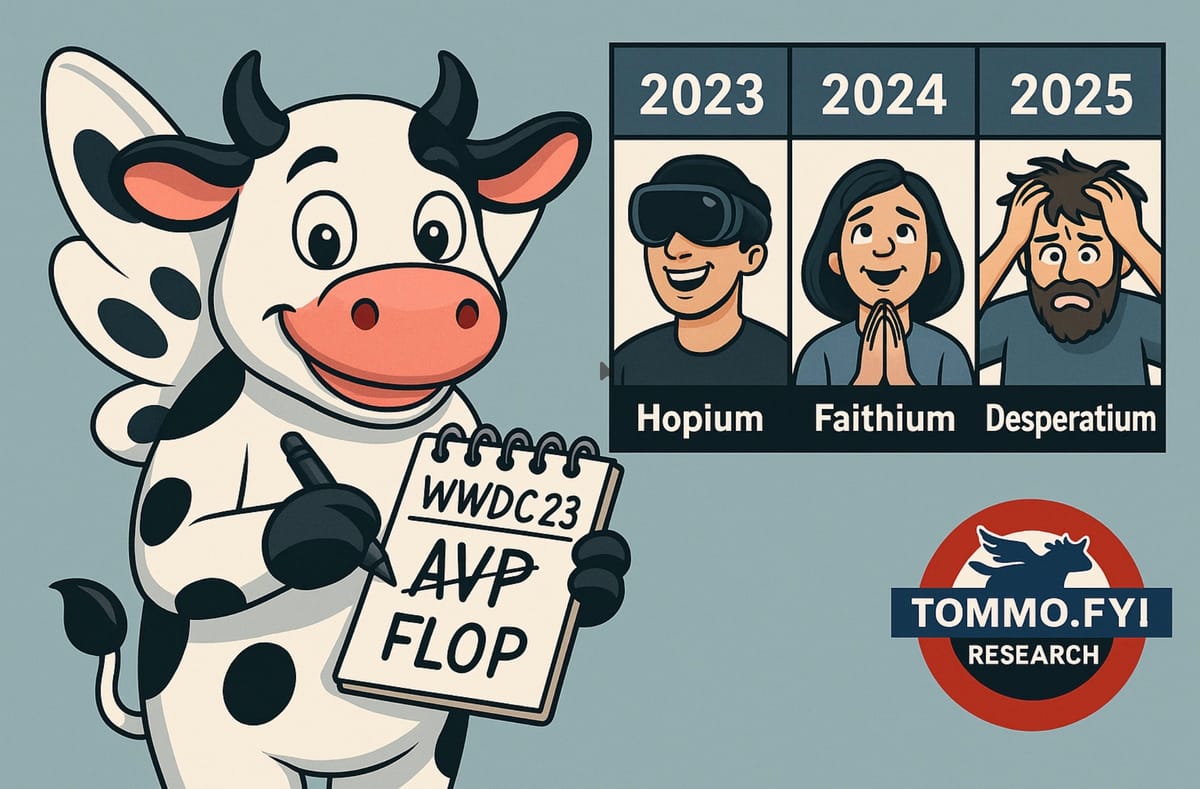
Siri’s reboot is “contextual assistance.” Everything remains boxed, branded, and billed. And fifteen years late;
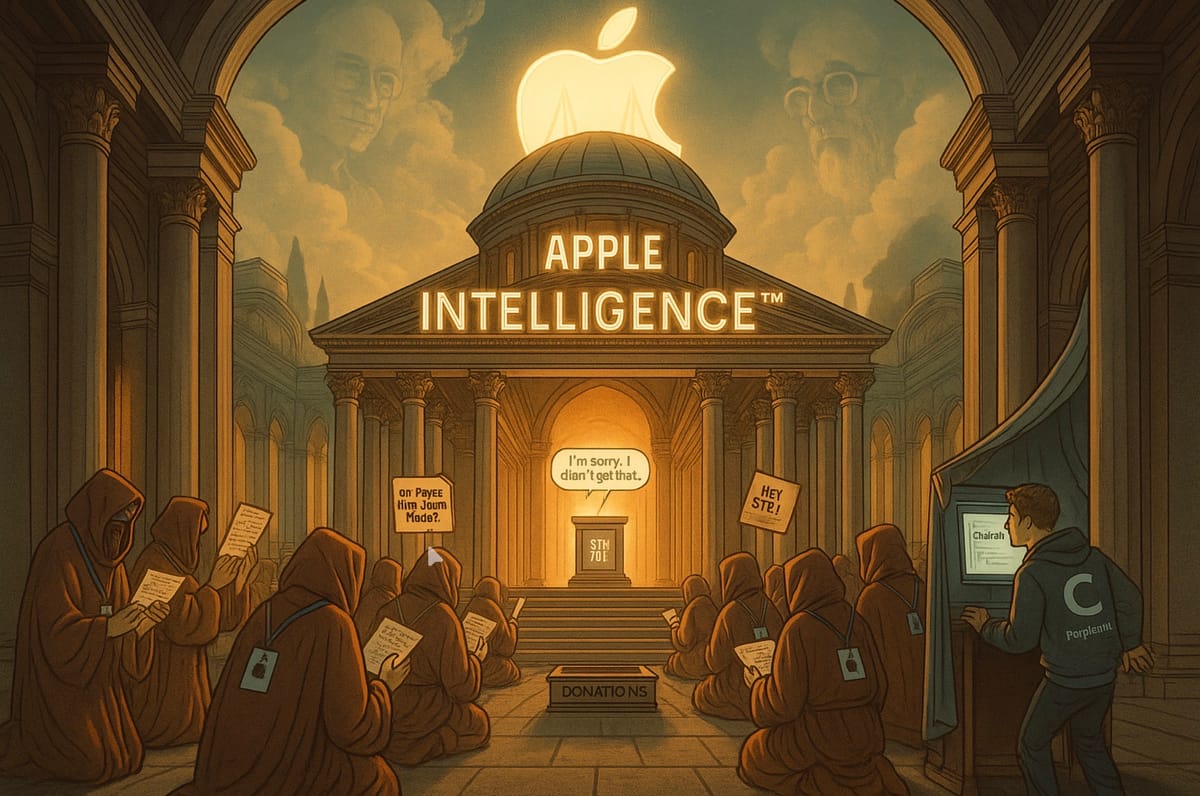
Meanwhile:
- OpenAI just made context itself the new operating system.
- Perplexity made browsing obsolete.
And the rest of the world is beginning to realise that the old distinctions - app, OS, browser - are historical artefacts. Beautiful ones, to be sure. But relics all the same. Apple just EOL’d a load of iPhones it no longer wishes to support as of the iPhone 17 launch and iOS26. Perhaps they do us a kindness by cancelling Safari too and give us the true agentic OS we all needed when they cancelled the Blackbird Project in 2018 and went with Siri X (dumb Siri in other words) instead. Look it up - it’s all in my article.
4. The Quiet Unraveling of Platform Power
This is how enshittification sneaks up on a company.
Not in a blaze of scandals or ads, but in a slow inversion of value flow.
Apple was once the company that liberated users from the beige tyranny of Windows. Now, it’s the one that locks developers out with notarisation prompts, takes 30% of independent creators’ revenues, and makes users feel like intruders in their own devices, and refuses to actually release what it promises, absolutely swears, are “the best” and “the fastest” and “the most efficient” LLMs/AI/ML/SomethingIntelligence we or anyone have ever created.”
Anyone remember watching the Wizard of Oz and Dorothy discovering what was really behind the curtain? It’s beginning to feel a bit like that. Craig, WTF are you really doing and what the hell is this talk of John Ternus - who has presided along with Tim Cook, as Head of Hardware, of every failure over the last five years, becoming the next CEO. Is this for real? Or was Ternus quietly just nodding his head in approval at the Car, Siri decisions, AI, AVP, lacking any other real hardware initiatives other than Apple Silicon (which isn’t his department)? Is the man who presided of five years of hardware failure and coasting really the dynamic individual and visionary Apple needs?
I don’t know either - but I can see his track record, and it is no match for Brad Pitt in Apple’s fictionalised tribute to Formula 1 success in the face of ageing failure, F1: The Movie. Show me the money - and his track record for successful initiatives rather than flops - maybe my jaw won’t drop in boredom at the propsect.
Back to “enshittification”
Doctorow’s stages play out in reverse here:
Apple started out good to developers; then began serving shareholders instead; and now, as the ecosystem ossifies, is arguably serving nobody particularly well - not even itself, except by buying back its own share to prop up the share price, and increasing earnings by raising gross margins come through innovation, but financial services and selling high margin AppleCare insurance. If Steve Job’s Apple is now coining in the cash through selling financial services and insurance products, and financial engineering through buybacks, I think, at least in my books, that counts as being “enshittified.”
I’m not suggesting that Apple has become a “pile of crapgadgets,” as Doctorow described Amazon. But I am suggesting that its pattern of innovation has become predictable, defensive, and trapped inside its own design mythology.
It’s the enshittification of purpose.
5. The Open Protocol Future — And Apple’s Absence From It
When OpenAI’s MCP was released, the most striking thing wasn’t its ambition but its openness.
- A shared schema, not a walled SDK.
- An API registry that’s self-describing.
- A universal interface language for intent.
That’s what Microsoft saw early when it poured billions into OpenAI: not just a chatbot, but a distribution layer for digital labour and an investment in a future it recognised long before Apple wanted to even consider people might like a “chatbot” (once sneered at by Apple, for a decade, now boxed, because they can’t make it work yet, except - we’re assured - in private).
Azure is now the world’s largest AI app server.
Apple, by contrast, still wants developers to download Xcode, code for iOS, and pray their app passes review.
Other companies are now defining the protocols. Apple is still pruning its bonsai tree and insisting people don’t want the equivalent of a lark oak tree - a Large Language Model of their own, not OpenAI or Anthropic’s.
Bonsai trees, however exquisite, are designed, and pruned, deliberately, not to scale.
6. The Lesson from History: AWS, iTunes, and Now MCP
This is the third time we’ve seen this movie.
- In 2003, iTunes turned the web into a media protocol — and Apple rode it to dominance.
- In 2008, AWS did the same for compute — and Amazon minted a trillion-dollar moat.
- Now, in 2025, OpenAI’s MCP and Perplexity’s Comet are doing it for cognition and context.
Once the protocols are set, everyone else pays rent to use them.
That’s the long game, and it’s not Apple’s game anymore, unless they open up, right now, because for all of Apple’s “1.5B” installed user base, just GPT alone now has almost 1B active users, and growing at a rate of over 100M every month now - making it the most downloaded app, ever. Squatting on top of your iPhone and Mac, and now your OS.
7. Legacy or Laggard?
Tim Cook will leave an extraordinary legacy but not, perhaps, the one he imagines or frankly deserves, considering his extraordinary talent for operations and logistics. Sadly, as many - including me - have said for a long time he is not a product man, and for all his genius, it is an Achilles Heel for the man at the help of Apple’s leadership, one which has seen car crash after case crash for about five years, in spite of immaculate financial management by the same man in that time covering up epic launch failures.
Apple’s products are as beautifully built as ever. Its financials remain unmatched, through unrivalled engineering. But creative dominance is shifting not from Cupertino to Redmond or Mountain View, but to San Francisco and San Mateo, and even Stockholm‘a startup-scene, where OpenAI and Perplexity are quietly defining how the next billion users will think, browse, and transact. Even a new Italian company has launched an LLM to rival ChatGPT, but Apple are seemingly either to full of hubris, or too-complex plans for the future, or just lacking in competence to have delivered now what they promised in 2023 would be here in 2024 and mature in 2025 now on hold following a total re-write until 2026.
Meanwhile analysts assure us that AI doesn’t matter (but only for Apple) for now, because the ramp is long, and there’s “lots of time for Apple to catch up.”
Wow - I wonder how many ”buybacks” it cost to ensure that kind of ”initiated coverage.”
Succession Talk
Apple’s rumoured successor, hardware chief John Ternus, would inherit not a company in decline, but one in aesthetic stasis for which he is largely responsible as its hardware head, and a brand still capable of brilliance, but addicted to iteration.
In an age of agentic computing, the next revolution won’t be shipped in a box. It will be a protocol. A bit like iTunes and the iPod defined the age of digital downloads and how to play them, for several generations to follow, and laid out the motorway and on-ramp for the iPhone in the process years before it arrived. Analysts at the time poo-poo’d the need for an iPhone back then, calling it a niche product unlikely to succeed and uncompetitively priced. Luckily Steve Jobs liked taking risks back then, unlike his successor - or we’d all be using BlackBerries.
8. The Inevitable Irony
So yes, in contrast to Philip’s hopes, I believe it Apple may indeed have enshittified itself, not by becoming bad, but by becoming static and mistaking inertia for maturity. Somehow,
“It just works” turned into “It still works.”
The company that once shattered other peoples’ walled gardens now risks becoming the garden wall itself, and being overgrown.
And somewhere, in the deep irony of platform history, Cory Doctorow is probably smiling. Because the only thing worse than becoming a pile of junk…
… is becoming the plateau everyone else builds their junk on top of. And Apple has certainly shown it knows how to build, and maintain for years, plateaus.
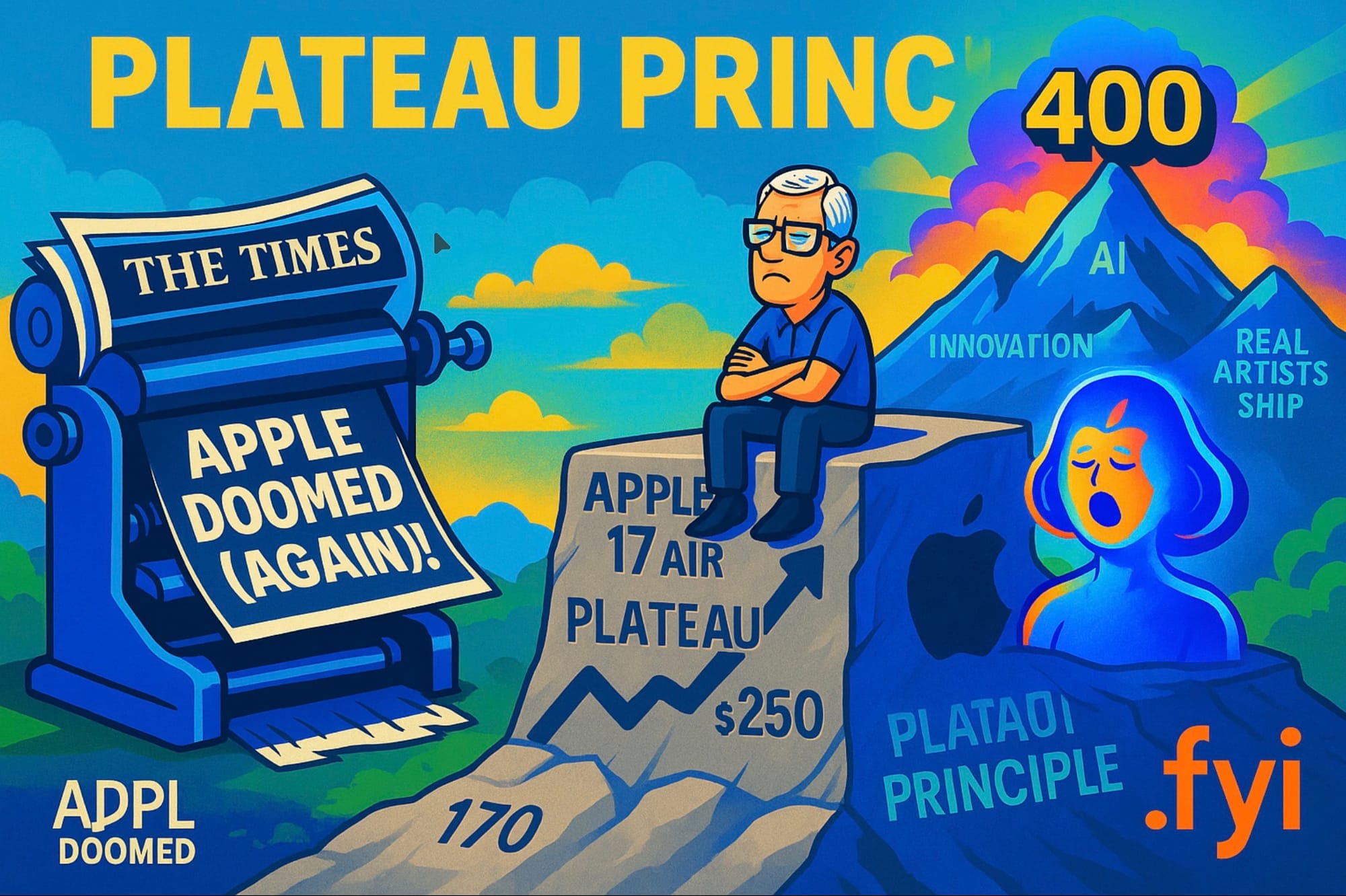
Postscript:
I wrote in July: “Agentic OSs will colonise before they conquer. They’ll arrive as assistants and leave as architectures.”
That’s happening now, and it’s happening faster than Apple’s “Veritas Answering Machine” can pick up the call.
Note From Author:
Do you care about this news, or does it “meh mean nothing to me?” I’ll leave you to answer, or disagree, in the comments.
Don’t shoot me if you don’t like the idea of Apple being “enshittified.”
Why don’t you leave your articulate remarks in the comments instead? Debate isn’t heresy (honestly), its due diligence.
And remember, if you can’t take some heat in the kitchen, agreeable to you or not, unsubscribing from innovative thought leadership is your prerogative:
It’s your choice if you choose to prune Bonsai trees - or would you rather grow oaks?
Coming Soon: Goodbye App Store, Hello Alt-Store?
Why the Ninth District Court Ruling on the App Store may not matter an “enshittification“ because the non-Apple Alt-Store, hitherto limited to the EU, has plans to expand to Australia, Brazil, and Japan later this year, with the UK next year.
Is this yet another walled garden about to come crashing inwards onto Apple, solely thanks, once more, to Tim Cook’s obsession with courtroom battles and alienating customers, regulators, and developers, seemingly all to skim a 30% profit off other people’s downloads?

— Tommo, London, Tuesday 7th October, 2025
X: @tommo_uk | Linkedin: Tommo UK
See the share buttons to LinkedIn, social media and email? Please, use them and help keep .fyi free at the point of readership. Or email this article on to a friend-in-need.







